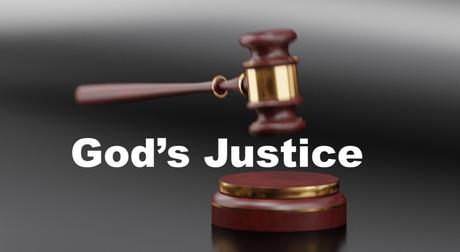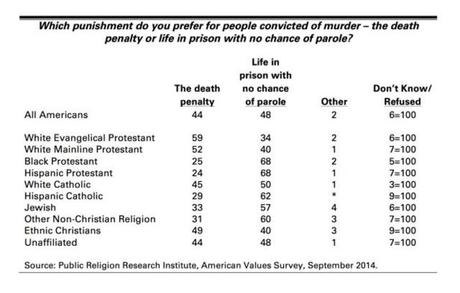Grace Thoughts
God’s Justice: How It Works (Part Six)

In the last part of our study we began looking at the human rights issue of the death penalty. God instituted the death penalty after Noah and his family left the Ark and re-established worship and offerings to God.
Many people and organizations oppose the death penalty, but what do God’s people think about it? Should we assume that people who believe in the God of the Bible support the death penalty?
Jewish View of Death Penalty
Many Jews around the world oppose the death penalty. That follows centuries of opposition. According to the Mishnah Sanhedrin I “cases of capital law are judged by 23 judges.” This was composed in Talmudic Israel (190-230 AD). It demonstrates that Jewish Law after the destruction of Jerusalem made the death penalty difficult to impose. You may also want to read Sanhedrin 17a composed in Talmudic Babylon (450-550 AD). It states – “In a Sanhedrin where all the judges saw fit to convict the defendant in a case of capital law, they acquit him.” The idea was that judges should not convict quickly, but allow overnight deliberation in case one of the judges would “think of a reason to acquit the defendant.”
Dr. Louis Jacobs, Former Rabbi of the New London Synagogue, wrote this in his 1995 book The Jewish Religion: A Companion:
According to the Mishnah (Sanhedrin 1:4) the death penalty could only be inflicted, after trial, by a Sanhedrin composed of twenty-three judges and there were four types of death penalty (Sanhedrin 7:1) … A bare reading of these and the other accounts in the tractate would seem to suggest a vast proliferation of the death penalty. Yet, throughout the Talmudic literature, this whole subject is viewed with unease, so much so that according to the rules stated in that literature the death penalty could hardly ever have been imposed.
As we read through rabbinic tradition from the last 19 centuries, we see that the straightforward Law God gave to Moses has developed into a complex system of damages and compensation. Jews of every background (e.g. Orthodox, Conservative, Reform) oppose the death penalty.
Among both the secular and religious leadership of American Jewry, there is widespread opposition to capital punishment. The Reform and Conservative movements have long been in favor of abolishing capital punishment, while the Orthodox Union, in 2004, expressed support for a moratorium ‘pending the implementation of appropriate reforms’ — among them, steps to address issues of fairness in the judicial system, in particular allegations of racial bias in administering the death penalty. The American Jewish Committee and the Jewish Council for Public Affairs have been longstanding opponents of the death penalty. The Death Penalty in Jewish Tradition
Christian View of Death Penalty
How about Christians? What do they think about the death penalty? Some Christians believe that people who commit premeditated murder should face the death penalty. Some Christians believe that people who commit any type of murder (e.g. 1st, 2nd, 3rd degree murder) should absolutely NOT face the death penalty. Both sides of the argument use the Bible to support their view. So, what are we to believe?
When we open the New Testament we find ourselves at a time when the Roman Empire occupied Israel. The Archelaus’ tetrachy included Judea, Samaria and Idumea. The capital was at Caesarea Maritima. We see Quirinius mentioned in the early part of Jesus’ life. Quirinius was a Legate (governor) for the Romans — “This census first took place while Quirinius was governing Syria” (Luke 2:2). King Herod, who Rome set up as a client king, was involved with trying to kill the young Jesus (Matthew 2). Jesus would face another Herod at His death (Luke 23). Herod Antipas was the son of the King Herod who wanted to kill Jesus when He was a young child. There’s an interesting interchange between Jesus and the Pharisees about Herod wanting to kill Him. Jesus said, “Go, tell that fox, ‘Behold, I cast out demons and perform cures today and tomorrow, and the third day I shall be perfected” (Luke 13:32). We also see Jesus healing the servant of a Roman centurion and being beaten and crucified by Roman soldiers. Pontius Pilate was the Roman prefect (governor) who tried Jesus and approved His crucifixion. Jesus knew the death penalty of the Roman government first-hand.
Jesus famously told Jews to love their enemies. That would have included Roman soldiers and those who worked for the Roman government (e.g. tax collectors). He also told Jews that if someone slapped them on their right cheek, which is something Roman soldiers were allowed to do to Jewish subjects, they were to turn the other cheek to him as well. Those are just a couple of examples many Christians give to support the idea that Jesus opposed the death penalty.
Jesus had a way of turning people’s arguments upside down and inside out. Here’s an example of that from His teaching about murder:
You have heard that it was said to those of old, ‘You shall not murder, and whoever murders will be in danger of the judgment.’ But I say to you that whoever is angry with his brother without a cause shall be in danger of the judgment. And whoever says to his brother, ‘Raca!’ shall be in danger of the council. But whoever says, ‘You fool!’ shall be in danger of hell fire.
Matthew 5:21-22
Jesus was not saying that the Old Testament Law concerning murder was wrong or outdated. He was addressing the way Jews had come to think about the Law of God. Jesus was pointing to the place where murder begins — in the heart of man. Jesus used that same Divine logic throughout His teachings. The leaders of the Jewish people were misinterpreting and misusing God’s Word and Jesus called them out on it.
Here’s more of what Jesus said about murder:
But those things which proceed out of the mouth come from the heart, and they defile a man. For out of the heart proceed evil thoughts, murders, adulteries, fornications, thefts, false witness, blasphemies. These are the things which defile a man, but to eat with unwashed hands does not defile a man.
Matthew 15:18-20
Look at the context to get the full idea of what Jesus was saying. The scribes and Pharisees questioned the external issue of the disciples of Jesus not washing their hands when they ate bread. “Why do Your disciples transgress the tradition of the elders?” Here’s how Jesus responded, and note the mention of the death penalty:
“He answered and said to them, ‘Why do you also transgress the commandment of God because of your tradition? For God commanded, saying, ‘Honor your father and your mother’; and, ‘He who curses father or mother, let him be put to death.’ But you say, ‘Whoever says to his father or mother, ‘Whatever profit you might have received from me is a gift to God‘— then he need not honor his father or mother.’ Thus you have made the commandment of God of no effect by your tradition. Hypocrites! Well did Isaiah prophesy about you, saying: ‘These people draw near to Me with their mouth, And honor Me with their lips, But their heart is far from Me. And in vain they worship Me, Teaching as doctrines the commandments of men.’
Matthew 15:3-9
Jesus then called a large crowd of people to Himself and said — “Hear and understand: Not what goes into the mouth defiles a man; but what comes out of the mouth, this defiles a man” (Matthew 15:10-11). It was after this that Jesus said that “murders” proceed out of the heart. That goes back to what God told Noah thousands of years earlier — “although the imagination of man’s heart is evil from his youth” (Genesis 8:21). God then gave Noah the death penalty ..
Surely for your lifeblood I will demand a reckoning; from the hand of every beast I will require it, and from the hand of man. From the hand of every man’s brother I will require the life of man. ‘Whoever sheds man’s blood, By man his blood shall be shed; For in the image of God He made man. Genesis 9:5-6
One way to discover what Christians think about anything is to ask them. Here are some poll numbers that may help us understand what Christians think about the death penalty.
The 2014 Public Religion Research Institute Poll showed that White Christians approved of the death penalty at a higher number than Black or Hispanic Christians.

We might add that Pope Francis changed Catholic teaching to fully oppose the death penalty in 2018, so that may have an impact on the number of Catholics approving of the death penalty in the future.
Another reason that the number of Christians who approve of the death penalty has dropped in recent years is because of age. A Barna Poll in 2014 showed that younger Christians are less supportive of the death penalty. Many Millennial Christians don’t believe Jesus would support the death penalty. While almost half of Boomer Christians “support the government’s right to execute the worst criminals,” only 23 percent of practicing Christian Millennials support it.
Next Time
Is that true? Would Jesus not support the death penalty today? We’ll look at that in the next part of our series, God’s Justice: How It Works.
Scripture taken from the New King James Version®. Copyright © 1982 by Thomas Nelson. Used by permission. All rights reserved.
GraceLife © 1990-2022
 ChristiansDeath PenaltyGod's JusticeJesus ChristJews
ChristiansDeath PenaltyGod's JusticeJesus ChristJews

Published by gracelifethoughts
Founder & Director of GraceLife Ministries View all posts by gracelifethoughts
